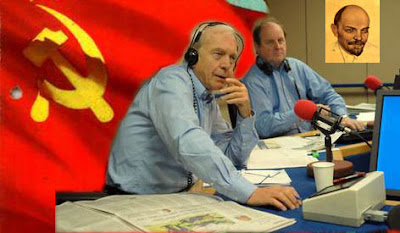Catching up on some summer posts that I didn’t quite finish at the time, there was an interesting article in Private Eye no. 1191, 17-30 Aug. 2007, giving “the full story of Channel 4, the CPS and the lies told by West Midlands Police” about the recent to-do over Channel 4’s Undercover Mosque programme broadcast in January.
Although Undercover Mosque was a Channel 4 programme it is pertinent to Biased BBC on at least two counts:
Firstly, that the BBC seems unwilling and unable to make undercover hidden camera programmes about anything that doesn’t fit the BBC’s definition of ‘bad’ (e.g. supermarkets, private security contractors, the police, the BNP etc.) – not that these aren’t worthy of investigation, but there are many other organisations and groups that also need to have their private deeds exposed to the glare of public scrutiny too (see the second part of this post, BBC Newspeak: Four legs good, two legs bad, for a few suggestions from a couple of years back Beeboids);
Secondly, the complete indifference of BBC News and BBC Views Online to the original broadcast of this programme. As with the first point, undercover programmes (including those from Channel 4) that the BBC approves of are covered, whereas those that aren’t approved don’t get covered. Undercover Mosque was barely mentioned by the BBC until August, when BBC Views Online opined C4 ‘distorted’ mosque programme, cheerily reporting criticism of the programme – the very criticism that Private Eye completely demolishes:
Playing silly burkas
The silliest of all this summer’s silly season stories broke last Wednesday, when the West Midlands Police and the Crown Prosecution Service issued a joint press release attacking Undercover Mosque, a Dispatches programme broadcast in January by Channel 4.
The film showed preachers at various “moderate” British mosques – notably the Green Lane mosque in Birmingham – delivering wild rants against kuffaar (non-muslims). “We hate the people of kufr, we hate the kuffaar”, Abu Usamah of Green Lane mosque declared, adding that although he didn’t agree with terrorists “at the same time they’re closer to me than those criminals of the kufr… He’s better than a million George Bushes, Osama bin Laden, he’s better than a thousand Tony Blair’s because he’s a muslim”. Murtaza Khan, a teacher from Essex who preaches at many UK mosques, denounced non-muslims as “filthy” and “accursed”.
Last week’s press release quoted Bethan David, a lawyer from the CPS, who alleged that the film “completely distorted what the speakers were saying”by quoting them out of context. It revealed that Inspector Knacker, a.k.a. Anil Patani MBA, Assistant Chief Constable (Security and Cohesion) for the West Midlands force – is now making a formal complaint to Ofcom that the programme was unfair and misleading.
Had Patani bothered to check the [Ofcom] website beforehand he’d have realised that, under the legislation governing Ofcom, complaints about unfairness can come only from “the person affected”, i.e. someone who has been personally traduced in a programme or by someone offically authorised by that person to act for them. Since the West Midlands Police fits neither category, the “formal complaint”looks like a non-starter. It appears to be little more than a silly season publicity stunt – though quite an effective one, as it was duly and widely reported the next day by newspapers hungry for more tales of TV fakery.
The Eye asked the West Midlands Police why they hadn’t read the rules before lodging the complaint. A spokesman told us that they had “liaised”with Ofcom in advance and been assured that they were following the correct procedures. But is this true?
“No”, said an Ofcom spokesman. Ofcom saw the press release a mere ten minutes before it was issued. Did you “liaise” with the police? “We certainly didn’t”.
The police also told the Eyethat the formal complaint to Ofcom came jointly from themselves and the CPS. Again, this turns out to be untrue. But the confusion is understandable, since Bethan David of the CPS certainly aided and abetted the stunt.
Did the police or CPS discuss their criticism of the film with C4 before issuing the press release? No. (As one bemused C4 executive observed: “This isn’t what a proper police force does. It’s the sort of thing Alastair Campbell does”).
Even more surprisingly, neither Patani nor David has produced one shred of evidence – in the press release, or in simultaneous letters to C4 and Ofcom – to back up their serious allegations.
Even the Eye wouldn’t accuse a film-maker of “completely distorting”the truth without giving chapter and verse – and we’re not an official branch of the criminal justice system. So could the CPS please cite some examples of of complete distortion that support Bethan David’s defamatory attack on the film-makers’ integrity?
“No”, a CPS spokesman told us. “We don’t go into that level of detail”. Or indeed any detail at all. The same goes for the West Midlands Police.
But Knacker may eventually have to justify wasting public money on this media stunt when he could have been tackling real criminals. He and Bethan David may also find themselves having to defend their unsubstantiated allegations in a court of law: Channel 4 and HardCash Productions, the company behind the film, are considering suing the police and CPS for libel.
To their credit, BBC Newsnight did a great piece along these lines last week (one of several great Newsnight pieces recently – perhaps there’s hope yet), revealing, if I recall correctly, that West Midlands Police have spent £14,000 of taxpayers money on this investigation excluding staff costs, and that the investigation was started after they received precisely zero complaints from the public. I’ll try to find it and Youtube it later. You can view the original Undercover Mosque programme via Google Video.




